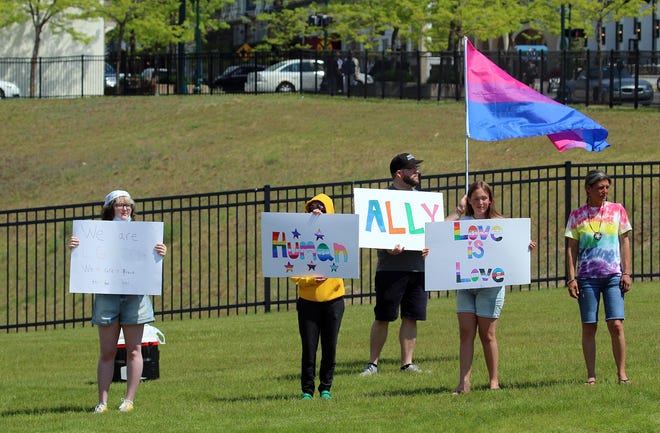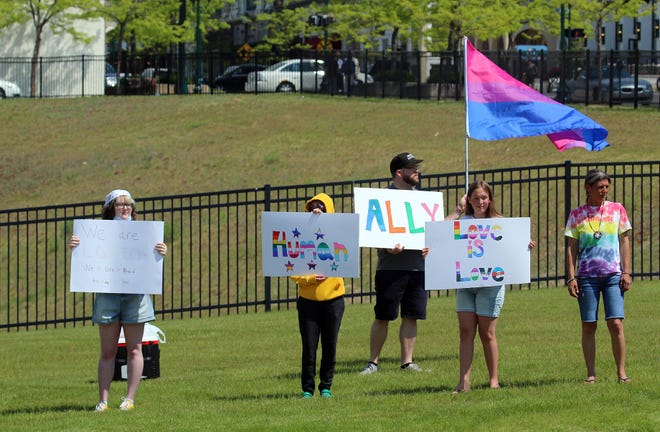
PETOSKEY — Pride Month for 2021 will officially end Thursday, but for many gender, romantic, and sexual minorities in Northern Michigan and beyond, the need for resources does not.
Recognition and support for gay, lesbian, bisexual, transgender, and other identities has risen in recent years — a poll from earlier this year from the Public Religion Research Institute showed that around 3/4 of Americans were in favor of laws protecting people from discrimination over their sexual orientation or gender identity. But other statistics show continued instances of inequality faced by LGBTQ+ people.
Kristin Jardine, co-founder of the Petoskey LGBT Alliance, said her organization has had some success in increasing visibility for LGBT members of the community, but that the next step is to help connect those community members to better resources that will allow them overcome certain obstacles they may face.
“When we started this group back in 2019, it was kind of in reaction to hatred we were seeing in our community,” she said. “What we’re trying to do is take it more from a (social) environment, which is what it’s been, to a more support environment.”
For the LGBT Alliance, Pride-related celebrations extend into July. The group was founded and organized its first annual “Flag Party,” in July 2019 following instances of anti-LGBT bigotry that were cropping up. Supporters plan their third event of its kind July 25.
“We’re seeing a lot more open mindedness and a lot more acceptance since we started the pride events a couple of years ago, and that feels really good to the community,” she said.
But also starting next month, Jardine said the Alliance will begin hosting adult support groups on the second Wednesday of each month at the Birth Center of Northern Michigan, 522 Liberty St. Those gatherings are intended for adults who identify as LGBTQ+, but Jardine said the long term goal is to be able to set up other such support groups for youth and parents. Those efforts are still in their early stages, but she said she hopes to be able to work with a local school Gay-Straight Alliance and facilitate a safe environment for those who would be involved.
She said some community organizations have stepped up, particularly the Petoskey District Library, which had gatherings for LGBT teens during Pride Month, but overall, there are still many issues that LGBT teens and adults face that need to be addressed.
“I think we’re really lacking in places to send people for support,” she said.
Being out as LGBT can have social, familial, economic and health impacts. Data from 2011 indicates, at that time, over a quarter of people who identified as LGBT had lost a job on the basis of their gender identity. LGBT youth experience homelessness at disproportionate rates
And previous findings by the National Alliance to End Homelessness found that homeless LGBT teens were 62 percent more likely to commit suicide.
Jardine said, in many ways, there isn’t enough of a knowledge base in the local support system to address those specific problems in all their nuanced meaning — for example, youth homelessness resulting from a teen’s sexual orientation just becomes a part of the youth homelessness problem in general.
National organizations such as the Trevor Project and PFLAG, Parents and Families of Lesbians and Gays, offer aid to teens who need support.
In terms of health, gay, lesbian, bisexual and transgender people face specific issues and have particular needs because of their identity.
She said organizations like Planned Parenthood can be a good resource for men, women and non-binary people, offering services like birth control, sexual and reproductive health screenings, and pre-exposure prophylaxis, a medication regimen used for preventing the contraction of HIV and AIDS.
“So there are some resources when it comes to health related issues,” she said. “Maybe you have your monthly exam that is much less binary and really offers pronoun language and honors who you are as a person, even if you’re in the middle of transition.”
Statewide and national resources can be found here: https://www.michigan.gov/documents/mdhhs/LGBTQ_Resources_507830_7.pdf








